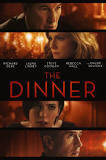The Dinner–Food for Thought

This darkly suspenseful tale of two privileged families is based upon the Dutch author Herman Koch’s bestselling 2013 novel. The families struggle to make the most consequential decision of their lives, all over the course of dinner at an exclusive Manhattan restaurant. Upper class privilege and sibling rivalry are at the heart of The Dinner, a psychologically astute family saga.
A middle-aged high school history teacher, Paul (Steven Coogan), and his wife Claire (Laura Linney) reluctantly have dinner with Paul’s elder brother, Stan (Richard Gere), a prominent politician running for governor, and his second wife Babette (Rebecca Hall).
We slowly become aware that a savage and heinous family trauma has occurred. As silver globes are pretentiously lifted to reveal dinner courses, a family secret will soon be revealed. The setting underscores the absurdities of deeply unhappy, entitled lives, hiding underneath the shimmering surface beauty of elegance. Appearances are deceiving. Paul despises the pretentiousness of the restaurant, as much as he does his brother’s success. Neither brother wants to be at this dinner.
Reminiscent of Edward Albee’s “Who’s Afraid of Virginia Wolf” or Tennessee Williams’ “Glass Menagerie”, The Dinner ominously guides the viewer to witness the desperate tenacity a parent will resort to in order to secure their child’s future or the dissolution of a marriage, sometimes both. Is no act too reprehensible? What if collateral damage is unavoidable?
The Dinner just ends, as if in mid-sentence. I personally loved this. Some reviewers and audience members absolutely hated this. Questions of morality and justice remain unanswered. Viewer beware: There really is no one to root for or like. But the four characters are equally riveting and their moral dilemmas persuasive.
And this is what makes The Dinner so
compelling. It is a dissection of family
obligation and where it ends. As Stan,
the gubernatorial candidate responds, “family is always
political.”
It will not be for the viewer who seeks the cozy, the redemptive or the uplifting. If you are such a viewer, do not see this dark, noir, nihilistic film. The specter of no moral compass is hinted at throughout.
This is a different review because of The Dinner’s not insignificant flaws. The Dinner does not become a spellbinder until way into the second half of the film. The first languorous forty-five minutes are almost too painful to watch, except for essential snippets of the family’s history.
As difficult a task as this may sound, persevere even though the irrelevance of most of the first half of this movie may wear you out. When The Dinner does finally reach its climax, the movie crackles, incendiary and explosive. All four actors give extraordinary, unsettling, and unforgettable performances. More cohesion and restraint in editing would have made The Dinner truly exceptional.
Note: Available on Netflix streaming.
